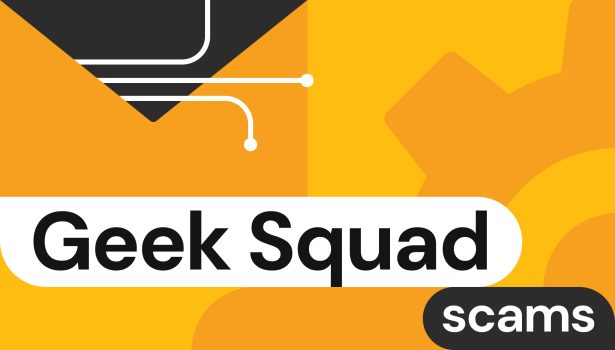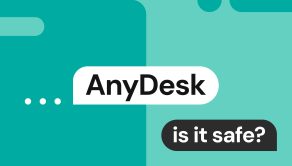Geek Squad scam: what it is, how it works, and how to avoid it

Tech support scams have become increasingly common, and Best Buy’s Geek Squad support is a frequent target of impersonation by scammers. As one of the largest consumer electronics retailers in the US and Canada, Best Buy is a go-to shopping destination for thousands of buyers. Add their membership and extended warranty programs, and this gives scammers a vast territory to run their exploits.
If you shop with Best Buy, read on to learn about the most common types of Geek Squad scams, how to tell a legit tech support message from a fake one, and how to stay protected from attempts to steal your money or personal data.
What is the Geek Squad scam?
In Geek Squad tech support scams, scammers pretend to be affiliated with Best Buy’s authorized technical support team—the Geek Squad—and target Best Buy customers with fraudulent offers and requests. The goal of Geek Squad scams is usually to manipulate victims into clicking malicious links, paying fake invoices, granting remote access to their devices, or giving away sensitive personal information such as credit card data.
How does a Geek Squad scam work? This is a type of phishing attack that can happen via Geek Squad scam emails, phone calls, text messages, or pop-up banners across the internet. The message will be designed to resemble Geek Squad’s branding, colors and website domain. Typical premises include charging the victim for a “subscription” or claiming there’s a technical issue with their purchase, such as a virus detected on their device.
If the scammer succeeds in gaining access to your device or financial information, this may let them steal your identity or funds, infect your device with malware, or take over your accounts using stolen credentials.
Is Geek Squad a scam?
No, Geek Squad is not a scam. With so many scam reports related to Geek Squad, it’s easy to think this service is fraudulent. But in fact, Geek Squad is a fully legitimate technical and customer support service run by Best Buy—available online, over the phone, via email, and in person—providing a real-time assistance to their many customers.
Geek Squad’s areas of expertise include consulting customers on the status of their orders, membership subscriptions, various extended warranty plans, and repair or troubleshooting requests. However, due to Best Buy’s widespread recognition and trust, scammers frequently impersonate its tech support team, preying on people familiar with the brand who may be more likely to let their guard down.
If you’re unsure whether a Geek Squad message is legitimate, don’t respond and verify the information independently on the Best Buy official website or by contacting their support directly.
Now, let’s look at the variety of scams impersonating Geek Squad so you can tell a legit message from a fake one.
Common types of Geek Squad scams
Scammers frequently impersonate well-known brands’ tech support because these brands’ customers already expect some kind of communication from them. For example, tech support impersonation is common in Poshmark scams or Airbnb scams.
But Best Buy is notoriously the most impersonated company in the U.S., as reported by the Federal Trade Commission—followed by Amazon and PayPal. With over 52,000 reports and a total loss of $15 million a year related to Best Buy and Geek Squad impersonation scams, it’s critically important for you to know the most common scamming techniques and how to stay away from them.
Geek Squad invoice scam
Bad actors send out fake Geek Squad emails imitating the branding and email layout to trick recipients into believing there’s a pending invoice they need to pay. In some cases, the charge is said to be automatic unless the recipient contacts them to cancel the transaction. In reality, this is a bogus invoice meant to lure the victim into contacting the scammers, who can then manipulate the person into sharing banking details or other sensitive information.
Geek Squad renewal scam
This is one of the most common types of Geek Squad phishing emails, alerting customers that their subscription is about to be renewed automatically.
Fake subscription renewal emails contain details like the subscription price, customer ID, and even the invoice number, but all of this is fabricated to make you believe you’ll be charged unless you contact the “support line” or “customer care” within the next 24 hours (or some other pressing deadline).
You may be redirected to a fake support page designed to look like Best Buy, requesting your payment data, or asked to call a phone number operated by the scammers. If you do, the scammers will attempt to talk you into sharing remote access to your device, giving away personal information, or paying a fake invoice.
Geek Squad refund scam
Geek Squad scam emails often come with a phone number that the recipient should call if they didn’t authorize the transaction stated in the email, such as an automated subscription renewal or a protection plan purchase, and want to “cancel” it.
Naturally, the person would want to prevent being charged for something they don’t remember ordering. If they call the provided number, they’ll reach scammers who will social-engineer them into giving away banking information.
Remote tech support scams
You may come across online alerts or banners urging you to fix a serious problem with your device. These banners are engineered by scammers posing as Geek Squad agents, offering to fix the issue if you grant them remote access to your device. If you do, they can take control of your device and steal valuable information, such as account credentials and payment card data.
Fake Geek Squad agents may also install spyware through a fake antivirus software scam, which records and steals data as you enter it. They may also demand payment for their “services” via PayPal or another money transfer method that’s difficult to dispute.
In some cases, Geek Squad impersonators claim there’s suspicious activity in your account or say it’s compromised, prompting you to reset your password using a provided form. This allows them to steal your Best Buy credentials and place fraudulent orders using your account.
Malicious attachments
In some cases, Best Buy customers may receive fake order or payment confirmation emails containing an order receipt that “needs to be confirmed.”
If you happen to download such an attachment, it might install malware, keyloggers, or screencasting software that scammers can exploit to steal credentials, payment data, and other sensitive information.
If you receive a suspicious email with an attachment, flag the email as spam and verify your Best Buy order independently in your account on their official website.
Gift card scams
Though not always enacted by Geek Squad impersonators, gift card scams often target Best Buy customers who are misled into believing they are buying a legitimate Best Buy gift card that later turns out to be fake. In another instance, fake Geek Squad support reps may trick you into buying a real Best Buy gift card and sharing its number with them so they can steal the gift card funds.
Best Buy is aware of gift card scams and recommends their customers buy gift cards only from official Best Buy outlets and never purchase gift cards that appear to be tampered with or have their PIN exposed.
How to identify Geek Squad phishing emails and messages
Fake Geek Squad emails or text messages are easy to spot if you know these red flags to watch out for:
- Unexpected and unsolicited communication about subscription renewals or detected tech issues.
- Generic greetings such as “Dear Customer” or “Dear Sir/Madam.”
- Email domains with altered or misspelled versions of bestbuy.com or geeksquad.com, or emails sent from Gmail or Hotmail accounts.
- Suspicious links and attachments that you’re encouraged to click or download.
- Odd grammar, punctuation, and wording that doesn’t reflect typical brand communication.
- Urgency and pressure to act fast, often within 24 hours.
- Requests to call a number immediately.
- Requests for remote access to your device without any support ticket registered by Best Buy.
Remember that real Geek Squad agents will never:
- Contact you unsolicited.
- Address you impersonally—they should have your name on file if you registered with Best Buy.
- Ask for remote access to your device unless you initiate a support request via the official Best Buy website.
- Request payments over the phone, via cryptocurrency, gift cards, or wire transfers.
- Give you just 24 hours to dispute a charge or cancel a request.
- Redirect you to third-party websites.
- Threaten you with account deactivation.
If you are an active Best Buy customer, you can expect communication from them only in certain cases:
- After you make a purchase or place an online or in-store order.
- If you’ve scheduled a Geek Squad service, based on your scheduled service request.
- After you’ve contacted Geek Squad for assistance.
- If the product you purchased has been recalled or there is an important safety update.
- If you’ve opted in to receive promotional offers.
- When your known protection plan or membership subscription is about to expire, but there should be no unexpected charges.
All of this information can be verified in your online Best Buy account. If you’re unsure, go to bestbuy.com and check your order and service statuses directly.
How to protect yourself from a Geek Squad scam
It’s true that criminals may target you in a Geek Squad scam even if you have never bought anything from Best Buy. Taking into account the company’s vast customer base, scammers may simply send out phishing emails randomly, hoping to reach at least some success rate. But if you are a Best Buy customer, you should be even more vigilant not to get tricked.
In 2018, Best Buy suffered a data breach incident via their online support technology partner, affecting customers’ data records and payment information. If you were a Best Buy customer before that, chances are your data might have been exposed too. When scammers know that you shopped at Best Buy, it becomes easier for them to personalize their communication and make their requests seem legitimate.
So, the first step to protect yourself against Geek Squad impersonators is to check if any of your personal data records have been leaked online, including through data breaches. For this, you can use dark web monitoring to sift through data dumps, hacker forums, and darknet marketplaces automatically.
Once you make sure your digital footprint is intact and your Best Buy credentials haven’t been compromised, consider adopting the following safe practices to avoid scammers:
- In case you receive a suspicious message, verify the sender or the caller ID. The only legitimate email domain of Best Buy is @bestbuy.com. Scammers commonly use misspelled or altered versions.
- Never call the phone numbers or click the links in unsolicited emails, text messages or online banners that use pressure and urgency to make you act on a problem with your device or Best Buy subscription renewal.
- Ignore emails or other types of communication asking you to “verify” your identity so that you don’t lose access to your account. Legitimate companies don’t act this way. If in doubt, stop communicating and contact the official Best Buy support channel instead.
- Never share your personal, financial, or account access information (email, usernames, and passwords) with anyone, even if they claim to be from Geek Squad. No legitimate tech support agent asks for sensitive information.
- Never buy a Best Buy gift card outside of official Best Buy outlets.
- Report phishing emails and text messages via your provider, such as by flagging emails as junk or spam, and forwarding texts to SPAM (7726).
- If you suspect a scam related to Best Buy or Geek Squad, report it via email to abuse@BestBuy.com.
How to contact the real Geek Squad
If you believe there’s a problem with your Best Buy purchase, there are official technical support channels you can use to resolve it:
- Contact Best Buy’s Live Tech Support for real-time remote diagnosis and troubleshooting.
- If you require an in-person service, you can book an appointment online.
- For immediate guidance on the best way to resolve your issue, chat with a support agent online.
As you can see, none of these methods involve any unsolicited communication on Geek Squad’s behalf. When reaching out to them via an official channel, you can be sure you’re talking to someone authorized to provide technical assistance in line with the company’s policies.
What to do if you’ve fallen victim to a Geek Squad scam
In an unfortunate event of falling victim to a Geek Squad impersonator, take these immediate steps to minimize the damage:
- Stop all communication with the scammer.
- Switch off your device if you’ve given remote access to it.
- Run a full antivirus scan to check for any malware installed.
- Take screenshots of your communication to be used as evidence when reporting the scam.
- Check your credit card charges and notify your financial services provider if you shared your payment details with the scammer.
- Change the passwords for your Best Buy and email accounts, and set up two-factor authentication if you haven’t already.
- Report the scam to the Federal Trade Commission (in the U.S.) or the Anti-Fraud Centere (in Canada).
- Monitor your accounts for suspicious activity—on your own or by subscribing to an identity theft protection service.
Even the most tech-savvy people can be caught off guard when contacted by a famous brand impersonator. Tech support scams like the ones imitating Geek Squad are designed to look convincing and play on urgency and trust. If you’ve been tricked, you can contain the damage by acting swiftly and strengthening your digital habits to avoid similar incidents going forward.
FAQs
How can I tell if a Geek Squad message is a scam?
Look at the sender’s contact information and verify that it belongs to Best Buy—scammers often use misspelled or altered versions of bestbuy.com, or generic email accounts like Gmail. Also, look out for vague or unusual phrases, invoices for services or subscriptions you don’t recall ordering, requests for remote access to your devices, and unexpected payment requests and confirmations.
Does Geek Squad ever contact customers without a service request?
No, Geek Squad only responds to service requests initiated by the customer. They will never contact you unsolicited or request that you pay an invoice or grant access to your electronic device.
Can I recover money lost to a Geek Squad scam?
You can dispute any fraudulent financial transactions with your bank or payment card provider, informing them that you’ve been scammed. It’s not always possible to recover funds lost in a scam, but acting quickly is critical in the process.
How do I report a fake Geek Squad email?
You can report an email scam attempt directly to Best Buy by sending an email detailing the incident to abuse@BestBuy.com. You should also report the scam to the Federal Trade Commission (in the U.S.) or the Canadian Anti-Fraud Centere, depending on your location.





Dimitri is a tech entrepreneur and founder of Onerep, the first fully automated data removal service. Top cybersecurity CEO of 2021 by The Software Report.